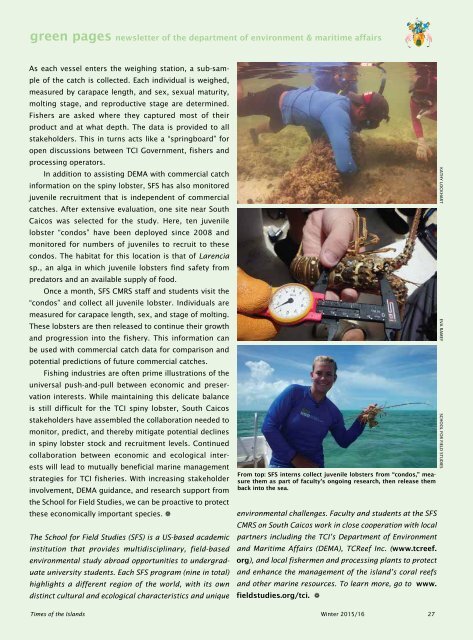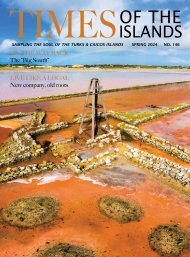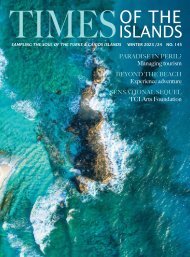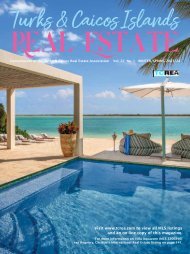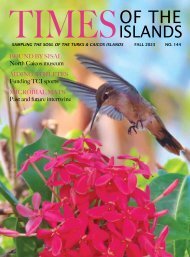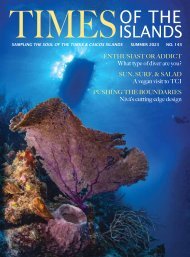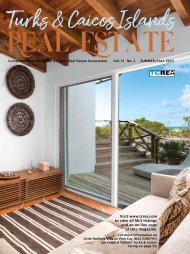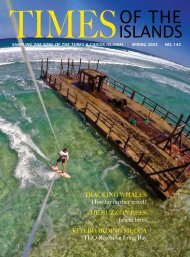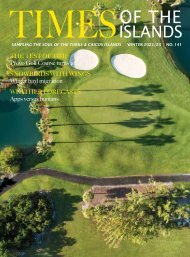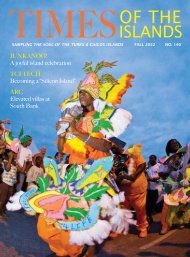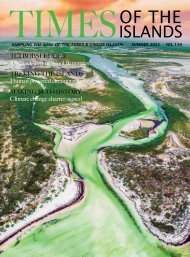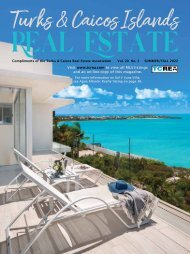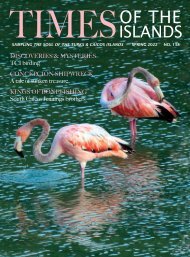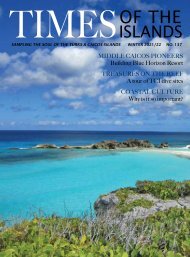Times of the Islands Winter 2015-16
Presents the "soul of the Turks & Caicos Islands" with in-depth features about local people, culture, history, environment, businesses, resorts, restaurants and activities.
Presents the "soul of the Turks & Caicos Islands" with in-depth features about local people, culture, history, environment, businesses, resorts, restaurants and activities.
Create successful ePaper yourself
Turn your PDF publications into a flip-book with our unique Google optimized e-Paper software.
green pages newsletter <strong>of</strong> <strong>the</strong> department <strong>of</strong> environment & maritime affairs<br />
As each vessel enters <strong>the</strong> weighing station, a sub-sample<br />
<strong>of</strong> <strong>the</strong> catch is collected. Each individual is weighed,<br />
measured by carapace length, and sex, sexual maturity,<br />
molting stage, and reproductive stage are determined.<br />
Fishers are asked where <strong>the</strong>y captured most <strong>of</strong> <strong>the</strong>ir<br />
product and at what depth. The data is provided to all<br />
stakeholders. This in turns acts like a “springboard” for<br />
open discussions between TCI Government, fishers and<br />
processing operators.<br />
In addition to assisting DEMA with commercial catch<br />
information on <strong>the</strong> spiny lobster, SFS has also monitored<br />
juvenile recruitment that is independent <strong>of</strong> commercial<br />
catches. After extensive evaluation, one site near South<br />
Caicos was selected for <strong>the</strong> study. Here, ten juvenile<br />
lobster “condos” have been deployed since 2008 and<br />
monitored for numbers <strong>of</strong> juveniles to recruit to <strong>the</strong>se<br />
condos. The habitat for this location is that <strong>of</strong> Larencia<br />
sp., an alga in which juvenile lobsters find safety from<br />
predators and an available supply <strong>of</strong> food.<br />
Once a month, SFS CMRS staff and students visit <strong>the</strong><br />
“condos” and collect all juvenile lobster. Individuals are<br />
measured for carapace length, sex, and stage <strong>of</strong> molting.<br />
These lobsters are <strong>the</strong>n released to continue <strong>the</strong>ir growth<br />
and progression into <strong>the</strong> fishery. This information can<br />
be used with commercial catch data for comparison and<br />
potential predictions <strong>of</strong> future commercial catches.<br />
Fishing industries are <strong>of</strong>ten prime illustrations <strong>of</strong> <strong>the</strong><br />
universal push-and-pull between economic and preservation<br />
interests. While maintaining this delicate balance<br />
is still difficult for <strong>the</strong> TCI spiny lobster, South Caicos<br />
stakeholders have assembled <strong>the</strong> collaboration needed to<br />
monitor, predict, and <strong>the</strong>reby mitigate potential declines<br />
in spiny lobster stock and recruitment levels. Continued<br />
collaboration between economic and ecological interests<br />
will lead to mutually beneficial marine management<br />
strategies for TCI fisheries. With increasing stakeholder<br />
involvement, DEMA guidance, and research support from<br />
<strong>the</strong> School for Field Studies, we can be proactive to protect<br />
<strong>the</strong>se economically important species. a<br />
The School for Field Studies (SFS) is a US-based academic<br />
institution that provides multidisciplinary, field-based<br />
environmental study abroad opportunities to undergraduate<br />
university students. Each SFS program (nine in total)<br />
highlights a different region <strong>of</strong> <strong>the</strong> world, with its own<br />
distinct cultural and ecological characteristics and unique<br />
From top: SFS interns collect juvenile lobsters from “condos,” measure<br />
<strong>the</strong>m as part <strong>of</strong> faculty’s ongoing research, <strong>the</strong>n release <strong>the</strong>m<br />
back into <strong>the</strong> sea.<br />
environmental challenges. Faculty and students at <strong>the</strong> SFS<br />
CMRS on South Caicos work in close cooperation with local<br />
partners including <strong>the</strong> TCI’s Department <strong>of</strong> Environment<br />
and Maritime Affairs (DEMA), TCReef Inc. (www.tcreef.<br />
org), and local fishermen and processing plants to protect<br />
and enhance <strong>the</strong> management <strong>of</strong> <strong>the</strong> island’s coral reefs<br />
and o<strong>the</strong>r marine resources. To learn more, go to www.<br />
fieldstudies.org/tci. a<br />
KATHY LOCKHART EVA RAMEY SCHOOL FOR FIELD STUDIES<br />
<strong>Times</strong> <strong>of</strong> <strong>the</strong> <strong>Islands</strong> <strong>Winter</strong> <strong>2015</strong>/<strong>16</strong> 27


